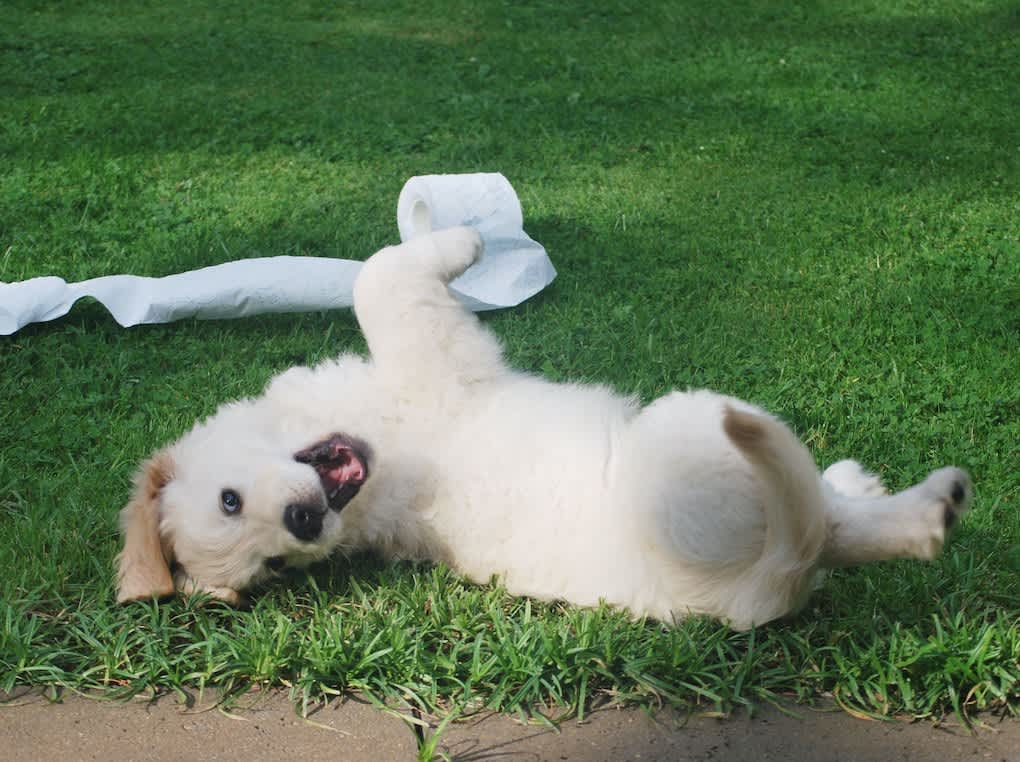Your new puppy is busy! All that playing, learning, and growing on the outside is only part of what’s going on. All your puppy’s internal systems are busy developing too. And because puppies’ immune and digestive systems are still immature, a parasite, pathogen, or even a new food can cause a lot more trouble than it would in an adult dog. The first sign of that trouble is often diarrhea.
Diarrhea in puppies
Diarrhea is defined as wetter-than-normal poop. (While puppies are still being milk-fed, it’s normal for their poop to be soft. But once they’re weaned, their digestive systems should adapt and start producing solid stool.) Diarrhea can mean a range of consistencies, from mushy to loose to watery. Learn more about what the consistency and color of your dog’s poop can tell you about their health.
Diarrhea is common in young puppies, says Dr. Dawn Kingsbury, Chief Veterinary Officer at AnimalBiome. And it isn’t always a sign of health problems. An episode of diarrhea from time to time is actually pretty normal for most mammals: it’s a way for the body to quickly get rid of something it can’t or shouldn’t digest.
But sometimes diarrhea indicates a serious health issue. And in puppies, diarrhea by itself can lead to dehydration and eventually to organ damage if left untreated.
Causes of diarrhea in puppies
Like adult dog diarrhea, puppy diarrhea can be caused by many different things. But puppies are especially susceptible to diarrhea because their digestive system and gut microbiome are still developing.
Possible causes of diarrhea in puppies include:
- Stress
- Diet change
- Antibiotic use
- Gut microbiome imbalance
- Intestinal parasites (e.g., roundworms, hookworms, whipworms, Coccidia, Giardia)
- Bacterial infection (e.g., C. perfringens, Campylobacter)
- Viral infection (e.g., parvovirus, canine enteric coronavirus [CCoV], norovirus, rotavirus, distemper)
- Ingestion of toxins, poisons, foreign objects, compost, or garbage (also known as “dietary indiscretion”)
- Food sensitivity (food intolerance) or food allergies
- Inflammatory Bowel Disease (IBD) or colitis
- Liver or kidney disease
- Health conditions with underlying genetic causes, such as Exocrine Pancreatic Insufficiency (EPI) or Imerslund-Gräsbeck Syndrome (IGS)
The puppy’s immature digestive system is a big factor in many cases of diarrhea. For a puppy transitioning from nursing to eating solid food, for example, diarrhea might be a normal reaction to new substances that the gastrointestinal tract is still learning to process. Even puppies who are accustomed to solid food may have diarrhea in response to a change in their diet.
Another factor is the gut microbiome—the community of thousands of different kinds of bacteria and other microbes that live in your puppy’s gastrointestinal (GI) tract. The microbial community in your puppy’s gut helps them digest their food and absorb key nutrients that are important for their growth and development.
Gut microbiome imbalances are especially likely in puppies who didn’t nurse from their mother. A mother dog’s milk provides puppies with the thousands of different kinds of dog-specific bacteria that will make up their gut microbiomes. A puppy who doesn’t get all of those beneficial microbes may not develop a well-balanced gut microbiome and may be at greater risk of digestive problems.
Testing your puppy’s microbiome can tell you what’s really going on in their digestive system. The Gut Health Test will reveal whether they have a bacterial imbalance in their gut, which can contribute to diarrhea or digestive upset.
Antibiotics can also cause diarrhea as a side effect. That’s because they kill off a lot of beneficial gut bacteria along with the bad bacteria (often outside of the GI tract) they’re meant to target. The resulting imbalance among the populations of gut microbes can lead to chronic inflammation and other issues. If your puppy is prescribed antibiotics and develops diarrhea, talk to your veterinarian about some extra support that may help during and after the treatment.
Why diarrhea can be dangerous for puppies
Even when it doesn’t signal an infection or other disease, diarrhea can be a threat to your puppy’s health. Because their little bodies have a higher ratio of surface area to weight than adult dogs, puppies can quickly become dehydrated. Dehydration can lead to electrolyte imbalances.
Electrolytes (like sodium and potassium) are vital for multiple functions of the body, including heartbeat, so trouble with your puppy’s electrolytes can quickly become a life-threatening emergency. In addition, ongoing diarrhea that leads to dehydration can eventually cause damage to the liver, kidneys, and heart.
Contact your veterinarian immediately if your puppy’s diarrhea is accompanied by vomiting, fever, lethargy, or any other additional signs of distress.
When to see a veterinarian
Call your veterinarian immediately if there’s any chance your puppy might have swallowed a toxic substance or foreign body, or if your puppy shows any of these signs:
- Bloody diarrhea
- Black, tarry stools
- Fever
- Vomiting
- Pale or tacky gums
- Lethargy or lack of energy
- Refusal to eat or drink
- Abdominal pain (tense belly, inability to get comfortable)
- Signs of distress
The most important thing is “how the puppy is feeling,” says Dr. Kingsbury. If your puppy has loose stools or liquid “squirts” but otherwise seems happy and is behaving normally, you can wait a day or so to see whether the diarrhea will resolve on its own. But don’t wait longer than 24 hours. By that point, even if diarrhea is your puppy’s only sign, you should seek veterinary care.
Puppy diarrhea and vomiting
If your puppy has both diarrhea and vomiting, see your veterinarian immediately. For one thing, diarrhea and vomiting together can lead quickly to life-threatening dehydration. In addition, the combination of these two signs may indicate parvovirus or another serious infection. It may also be a sign that that your puppy has ingested something toxic or that a foreign object or other indigestible material is causing a blockage in the digestive tract.
In addition to the many cleaning products and other common household chemicals that are toxic to pets, many human foods are bad for dogs, such as cherries, avocado, mushrooms, and onions. A few foods are downright poisonous, even in small quantities, like raisins, grapes, chocolate, and Xylitol.
What your veterinarian might do
Your veterinarian can run a number of tests that may help determine the cause of your puppy’s diarrhea. Checking for parasites (like Giardia or hookworms) and pathogens (like C. perfringens) is often the first step. An ELISA antigen test and white blood cell count can be used to check for parvovirus.
If your puppy has a bacterial infection, your veterinarian may recommend antibiotics. If the tests don’t find any parasites or pathogens, your veterinarian might recommend transitioning your puppy to a different diet.
How to support a puppy with diarrhea
If your veterinarian has determined that your puppy does not need to be treated for a viral or bacterial infection, you can focus on helping your puppy feel better. After an episode of diarrhea, it can take up to a week for your puppy’s gut lining to regenerate and their stool to return to a normal consistency. Fortunately, there’s a lot you can do to support your puppy’s developing digestive and immune systems.
Tips to help a puppy recover from diarrhea:
- Never fast a puppy!
- Feed a bland diet that’s low in fat and easily digested (such as cooked white rice and chicken).
- Always provide plenty of fresh water. A puppy should drink about 1.5 cups of water per 10 pounds of body weight per day. If your puppy won’t drink enough water, offer a little dilute (unsalted) chicken broth.
- Mix a little fiber into their food to help firm up your puppy’s stool. Try a teaspoon of Fiber One cereal, or add a little unflavored psyllium powder (start with ¼ tsp per meal and, over a few days, work up to 1 tsp per meal).
- Time, diet change, or treating an underlying medical condition are often enough to rebalance the bacterial population and increase its diversity. However, a small number of dogs may require a fecal microbiota transplantation (FMT) as a treatment. Speak with your veterinarian regarding unresponsive diarrhea and different fecal transplant options, including FMT in a capsule.
Wondering if a supplement could help resolve your puppy’s diarrhea? Learn all about probiotics, prebiotics, and other gut health supplements with Embark veterinarian Dr. Kari Cueva.
Preventing puppy diarrhea
Any puppy can have an episode of diarrhea from time to time, but you can help lower the chances. Here are some tips for preventing diarrhea in puppies:
- Always supervise puppies (and the children around them) to make sure they don’t eat anything they shouldn’t.
- Puppies should be confined whenever they’re unsupervised.
- Always introduce new foods gradually over the course of 7–10 days.
- Use proper, pet-safe disinfectants to clean surfaces.
- Keep up with the vaccination schedule recommended by your veterinarian.
- Until puppies are fully vaccinated, they should be kept away from unvaccinated dogs and public spaces.
- Talk to your veterinarian about parasite prevention and deworming.
- Clean up after your puppy and any other pets to make sure there’s no poop lying around.
Your puppy’s wellbeing depends on a lot of factors, and not all of them are under your control. But there’s a lot you can do to help your puppy grow up healthy and happy.
Learn more about the different factors that affect dog gut health and the gut microbiome in this article by Dr. Cueva.
This article was adapted from content originally published by our partners at AnimalBiome. Learn more about our partnership with AnimalBiome and how we’re working together to improve canine health.















